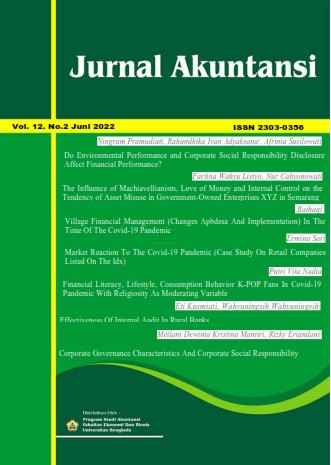Main Article Content
Abstract
Keywords
Article Details
Copyright (c) 2022 Putri Vita Nadia

This work is licensed under a Creative Commons Attribution-ShareAlike 4.0 International License.
Author retains the copyright and grants the journal the right of first publication of the work simultaneously licensed under the Creative Commons Attribution-ShareAlike 4.0 License that allows others to share the work with an acknowledgement of the work's authorship and initial publication in this journal
Author is able to enter into separate, additional contractual arrangements for the non-exclusive distribution of the journal's published version of the work (e.g., post it to an institutional repository or publish it in a book) with the acknowledgement of its initial publication in this journal.
Author is permitted and encouraged to post his/her work online (e.g., in institutional repositories or on their website) prior to and during the submission process, as it can lead to productive exchanges, as well as earlier and greater citation of the published work (See The Effect of Open Access).
Creative Commons Attribution-ShareAlike (CC BY-SA)
Jurnal Akuntansi is licensed under a Creative Commons Attribution-ShareAlike 4.0 International License.
References
- Defiansih, D. D. (2021). Pengaruh Religiusitas, Pendidikan Keluarga, Dan Sosialisasi Keuangan Terhadap Literasi Keuangan Syariah Dengan Kecerdasan Intelektual Sebagai Variabel Moderasi. Jurnal Ekonomi Dan Pendidikan, 18(1), 34–51. https://doi.org/10.21831/jep.v18i1.33146
- Frivanty, S., & Ramadhani, A. (2020). Pandemi Covid-19 sebagai Alasan Perusahaan untuk Melakukan Pemutusan Hubungan Kerja (PHK) Secara Sepihak. National Conference on Law Studies (NCOLS), 2(1), 422–434. https://conference.upnvj.ac.id/index.php/ncols/article/download/1470/942
- KUSUMANINGTYAS, I., & Canda Sakti, N. (2017). Pengaruh Literasi Keuangan Dan Gaya Hidup Terhadap Perilaku Konsumtif Siswa Kelas Xi Ips Di Sma Negeri 1 Taman Sidoarjo. Jurnal Pendidikan Ekonomi (JUPE), 5(3).
- Kusumastuti, A. E., & Kumalasari, R. A. (2017). Pengaruh Faktor Relatif dan Kontekstual Terhadap Perilaku Pembelian Konsumen dengan Religiusitas Sebagai Variabel Mediasi ( Studi Kasus Fashion Busana Muslim di Semarang ). Ebbank, 8(6), 1–16.
- Larasati, R. A. (2020). Pola Konsumsi Mahasiswa Pulang Kampung Dan Masyarakat Pada Pandemi Covid-19 Di Kota Bandung. Jambura Economic Education Journal, 2(2), 90–99. https://doi.org/10.37479/jeej.v2i2.6840
- Mawo, Thomas, S. (2017). Pengaruh Literasi Keuangan, Konsep Diri dan Budaya Terhadap Perilaku Konsumtif Siswa SMAN 1 Kota Bajawa. Journal of Economic Education, Volume 6 ((1), 60–65.
- Miatun, S. L., & Santoso, L. (2020). Pengaruh Religiusitas Terhadap Gaya Hidup Konsumen Muslim Di Ponorogo. SERAMBI: Jurnal Ekonomi Manajemen Dan Bisnis Islam, 2(2), 113–120. https://doi.org/10.36407/serambi.v2i2.181
- Praundrianagari, S. B., & Cahyono, H. (2021). Pola Konsumsi Mahasiswa K-POPERS Yang Berhubungan Dengan Gaya Hidup K-POP Mahasiswa Surabaya. INDEPENDENT : Journal Of Economics E-ISSN 2798-5008, 1, 33–40.
- Pulungan, D. R., & Febriaty, H. (2018). Pengaruh Gaya Hidup dan Literasi Keuangan Terhadap Perilaku Konsumtif Mahasiswa. Jurnal Riset Sains Manajemen, 2(3), 1–8. https://doi.org/10.5281/zenodo.1410873
- Rahmat, A., Asyari, A., & Puteri, H. E. (2020). Pengaruh Hedonisme dan Religiusitas Terhadap Perilaku Konsumtif Mahasiswa. EKONOMIKA SYARIAH : Journal of Economic Studies, 4(1), 39. https://doi.org/10.30983/es.v4i1.3198
- Rionita, D., & Widiastuti, T. (2020). Pengaruh Tingkat Pendidikan, Pendapatan Dan Religiusitas Terhadap Perilaku Konsumsi Rumah Tangga Muslim Di Surabaya (Kaidah Konsumsi Islami Menurut Al-Haritsi). Jurnal Ekonomi Syariah Teori Dan Terapan, 6(2), 288. https://doi.org/10.20473/vol6iss20192pp288-304
- Safitri, A. D. (2018). Pengaruh Religiusitas dan Konformitas Teman Sebaya Terhadap perilaku Agresif pada Remaja. Psikoborneo, 6(3), 327–333. https://ejournal.psikologi.fisip-unmul.ac.id/site/wp-content/uploads/2018/12/JURNAL AULIYA (12-03-18-10-53-51).pdf
- Saputri, A., & Rachmatan, R. (2017). Religiusitas Dengan Gaya Hidup Hedonisme: Sebuah Gambaran Pada Mahasiswa Universitas Syiah Kuala. Jurnal Psikologi, 12(2), 59. https://doi.org/10.24014/jp.v12i2.3230
- Sustiyo, J. (2020). Apakah literasi keuangan memengaruhi perilaku konsumsi generasi Z? Imanensi: Jurnal Ekonomi, Manajemen, Dan Akuntansi Islam, 5(1), 25–34. https://doi.org/10.34202/imanensi.5.1.2020.25-34
- Yushita, A. N. (2017). PENTINGNYA LITERASI KEUANGAN BAGI PENGELOLAAN KEUANGAN PRIBADI. Nominal, VI(1), 11–26.
References
Defiansih, D. D. (2021). Pengaruh Religiusitas, Pendidikan Keluarga, Dan Sosialisasi Keuangan Terhadap Literasi Keuangan Syariah Dengan Kecerdasan Intelektual Sebagai Variabel Moderasi. Jurnal Ekonomi Dan Pendidikan, 18(1), 34–51. https://doi.org/10.21831/jep.v18i1.33146
Frivanty, S., & Ramadhani, A. (2020). Pandemi Covid-19 sebagai Alasan Perusahaan untuk Melakukan Pemutusan Hubungan Kerja (PHK) Secara Sepihak. National Conference on Law Studies (NCOLS), 2(1), 422–434. https://conference.upnvj.ac.id/index.php/ncols/article/download/1470/942
KUSUMANINGTYAS, I., & Canda Sakti, N. (2017). Pengaruh Literasi Keuangan Dan Gaya Hidup Terhadap Perilaku Konsumtif Siswa Kelas Xi Ips Di Sma Negeri 1 Taman Sidoarjo. Jurnal Pendidikan Ekonomi (JUPE), 5(3).
Kusumastuti, A. E., & Kumalasari, R. A. (2017). Pengaruh Faktor Relatif dan Kontekstual Terhadap Perilaku Pembelian Konsumen dengan Religiusitas Sebagai Variabel Mediasi ( Studi Kasus Fashion Busana Muslim di Semarang ). Ebbank, 8(6), 1–16.
Larasati, R. A. (2020). Pola Konsumsi Mahasiswa Pulang Kampung Dan Masyarakat Pada Pandemi Covid-19 Di Kota Bandung. Jambura Economic Education Journal, 2(2), 90–99. https://doi.org/10.37479/jeej.v2i2.6840
Mawo, Thomas, S. (2017). Pengaruh Literasi Keuangan, Konsep Diri dan Budaya Terhadap Perilaku Konsumtif Siswa SMAN 1 Kota Bajawa. Journal of Economic Education, Volume 6 ((1), 60–65.
Miatun, S. L., & Santoso, L. (2020). Pengaruh Religiusitas Terhadap Gaya Hidup Konsumen Muslim Di Ponorogo. SERAMBI: Jurnal Ekonomi Manajemen Dan Bisnis Islam, 2(2), 113–120. https://doi.org/10.36407/serambi.v2i2.181
Praundrianagari, S. B., & Cahyono, H. (2021). Pola Konsumsi Mahasiswa K-POPERS Yang Berhubungan Dengan Gaya Hidup K-POP Mahasiswa Surabaya. INDEPENDENT : Journal Of Economics E-ISSN 2798-5008, 1, 33–40.
Pulungan, D. R., & Febriaty, H. (2018). Pengaruh Gaya Hidup dan Literasi Keuangan Terhadap Perilaku Konsumtif Mahasiswa. Jurnal Riset Sains Manajemen, 2(3), 1–8. https://doi.org/10.5281/zenodo.1410873
Rahmat, A., Asyari, A., & Puteri, H. E. (2020). Pengaruh Hedonisme dan Religiusitas Terhadap Perilaku Konsumtif Mahasiswa. EKONOMIKA SYARIAH : Journal of Economic Studies, 4(1), 39. https://doi.org/10.30983/es.v4i1.3198
Rionita, D., & Widiastuti, T. (2020). Pengaruh Tingkat Pendidikan, Pendapatan Dan Religiusitas Terhadap Perilaku Konsumsi Rumah Tangga Muslim Di Surabaya (Kaidah Konsumsi Islami Menurut Al-Haritsi). Jurnal Ekonomi Syariah Teori Dan Terapan, 6(2), 288. https://doi.org/10.20473/vol6iss20192pp288-304
Safitri, A. D. (2018). Pengaruh Religiusitas dan Konformitas Teman Sebaya Terhadap perilaku Agresif pada Remaja. Psikoborneo, 6(3), 327–333. https://ejournal.psikologi.fisip-unmul.ac.id/site/wp-content/uploads/2018/12/JURNAL AULIYA (12-03-18-10-53-51).pdf
Saputri, A., & Rachmatan, R. (2017). Religiusitas Dengan Gaya Hidup Hedonisme: Sebuah Gambaran Pada Mahasiswa Universitas Syiah Kuala. Jurnal Psikologi, 12(2), 59. https://doi.org/10.24014/jp.v12i2.3230
Sustiyo, J. (2020). Apakah literasi keuangan memengaruhi perilaku konsumsi generasi Z? Imanensi: Jurnal Ekonomi, Manajemen, Dan Akuntansi Islam, 5(1), 25–34. https://doi.org/10.34202/imanensi.5.1.2020.25-34
Yushita, A. N. (2017). PENTINGNYA LITERASI KEUANGAN BAGI PENGELOLAAN KEUANGAN PRIBADI. Nominal, VI(1), 11–26.

